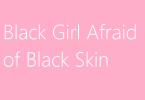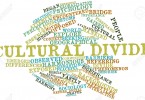By: Miela Foster
One day I woke up and I realized I was black. I was born in suburban Ohio. Everywhere I looked, I saw similar houses and faces. Immersed in a sea of homogenous culture my family stuck out like a sore thumb. However, I never felt out of place in my little suburb. I was well accepted amongst my peers, and made many friends. No one ever spoke of my skin color, no one ever spoke of my differences, I felt at home.
Before I was even born,my parents had befriended a black couple who lived a city away, and as my parents become closer to the couple so did my sister and I to their children. We quickly became best friends. To the kids at school I’d always say, “I’ve got this friend….” and I’d tell them about me and best friend’s adventures. Their eyes would light up after I told them story after story, they knew the strength of our friendship. I’d see the couple’s children almost everyday and we did everything together. Our friendship ran deep, but, it didn’t last forever.
Just after a seven long years in suburbia, my dad got a new job in Michigan. I didn’t mind that we were moving, I liked new experiences and meeting new people. What bothered me was the people I was leaving behind, my best friends. I was convinced that I was never going to have a friendship like I had with the couple’s children. The goodbye was painful and hard, I wasn’t ready to start over again.
Ann Arbor, college town, home of the University of Michigan was my next challenge. Although not a suburb, Ann Arbor morphed me in ways hard to imagine. There wasn’t a nice black couple a city away, there were no black neighbors, no open and loving people. For the first time in my life I compared myself to my peers and looked at our differences. The girls at my new school had many friends. They all seemed to act and speak the same way. They had slumber parties, Saturday afternoon playdates and played club sports together. It was clear that there were established friendships and I was the one left out. In order for me to fit in I needed to change and act like the other girls at school. I needed to play the part, so I did, and a new me emerged.
Sadly, middle school took the new me to another level. As I transitioned from the Powerpuff Girls to the PG-13 crowd I began to become more aware of black culture. The way TV portrayed this culture reflected nothing of my life. In fact, I found little similarities with a group of people that I was supposed to be a part of. I was embarrassed and ashamed of this culture. All of my friends were white and I didn’t want them to think that I reflected black culture.
Scared of losing all of my friends I revised my role: Black people were ghetto, they didn’t care about their future, but I was the different one. I was the exception to the rule. So I wasn’t really black, it was like God made a mistake when he colored me. I denied any and every connection to the black race. I distinctly remember my parents telling me over and over again, “You’re afraid of your own race”, “You hate yourself.” They knew that my new way of thinking went against everything they believed in. They were proud of being black and they wanted to instill that pride in their children.
My mother used to take my sister and I to her home church in Detroit every year for Easter. Influenced by TV, I began to fake being sick and hurt just to get out of visiting the mostly black city. I didn’t want to see the black faces, hear the black voices, face a new reality. I made fun of my mom for coming from Detroit, as if the people in Detroit were lower than the people of the suburbs. I was becoming a monster just for a seat at the lunch table.
Towards the end of middle school I encountered some black kids. I noticed that they avoided and ignored me. They had their own groups and didn’t try to talk to me. I used to say they shied away from me because they knew I was better than them, because I was in with the white crowd, and because I didn’t have to be black. But the truth was, nobody wanted to be friends with a girl who was afraid her people, a girl who was running away from her heritage, her identity.
I was moving on to the next stage of my life, high school. The true me was already starting to show: The defensive, argumentative and ignorant me. My friends slowly stopped talking to me, I was beginning to lose my connection to the white world. I was left to my own thoughts and somewhere in between eighth grade and freshman year I began to actually listen to my conscience.
I looked back on the comments that had been thrown at me over the years, “You’re not like those other black people”, “You’re pretty much white”, “You don’t act black.” They now seemed nicely vicious – putting my race down while praising my disconnection to it. My environment had not only brought on this hatred towards myself but had actually encouraged it.
What I didn’t realize when I was younger was that people never saw me as white, no matter how hard I tried to fit in. They saw my skin color and they knew I was black. It was only me who didn’t realize it. I was never going to be able to hide from my identity, the issue was, when was I going to accept it?
I had finally woken up from a sort of lucid dream. It was now time to love my people, and embrace my heritage. Being black wasn’t a bad thing, it wasn’t supposed to be a chore or a secret, it was supposed to be who I was, my identity. High school presented me with black people that were similar to me, and I gradually made black friends.
I didn’t need to fit in, I didn’t have to disown my people. It dawned on me that the black culture I saw on TV wasn’t black culture, but instead, it was some stereotypical attempt to add diversity to the media. Accepting my blackness felt natural and right. I had finally decided that my skin color would no longer be my scarlet letter.
I couldn’t say that I viewed people any differently, instead I became more aware of this world and myself. I am no longer fooled by nicely vicious comments and I am no longer pulled into the suburban black trap. Zora Neale Hurston once said, “I am not tragically colored. There is no great sorrow dammed up in my soul, nor lurking behind my eyes. I do not mind at all.” Through this all I’ve learned to love my race, and I‘ve finally learned to love myself. I am no longer ashamed and I don’t mind my blackness, not at all.










It is a tale of suburban black girls in this area in which a girl occurred and people read about her different activities. People read this tale and show their easy essay reviews in the black girl of tale.
She grew up a tomboy in suburban Chicago, a fan of Hot Wheels, … Decades later, the journeys of the two women tell a nuanced story of race . Eicfollowers
For many Black girls raised in the suburbs, the experiences of going to school, playing on the playground, and living day-to-day life can be uniquely alienating. by [url=https://buyfollowersaustralia.com.au/] buy instagram followers cheap [/url]
As the only black female character on “Daria,” Jodie offered both a glance in the mirror and a glimpse of my future. by Followers italy
She grew up a tomboy in suburban Chicago, a fan of Hot Wheels, … Decades later, the journeys of the two women tell a nuanced story of race … by buy Followers Australia
Grosse Pointe Girl: Tales from a Suburban Adolescence [McCandless, Sarah Grace, … by a vague timelessness like fog rolling in or a cinematic fade to black.
epicfollowerscanada
– Black women and Latino women consistently deliver huge margins to … As she tells the story, the teacher asked a question, Miranda answered … followerscanada
Minority young men are considered by their white peers to be cool and tough; minority young women, on the other hand, are stereotyped as … by ertugrul ghazi
For many Black girls raised in the suburbs, the experiences of going to school, playing on the playground, and living day-to-day life can be uniquely alienating.
by followers uk
Keywords: Black girls, African American girls, Critical Race Feminism, Critical Race. Theory … Elizabeth’s story serves as another glimpse into how difficult it was for … school districts and suburban students to city magnet schools. Currently …
by followers uk
Whereas the number of productions focusing on African American women … like much of black women’s literature, tends to be set in rural or suburban spaces. … despite her gender, follows a similar narrative trajectory as many fairy tales.
by buyactivefollowers
free caribbean dating
free crossdresser dating sites
free sex adult dating
free interracial dating site in south africa
free metalhead dating
free dating sites canton ohio
best free dating sites
free online canadian dating site
free dating sites no limits
are bananas keto
keto cake
keto diet plan pdf
bisexual dating gay man https://gaychatgay.com/
chubby gay dating https://gaychatrooms.org/
gay master slave dating sites https://gaychatus.com/
gay dating site for iphone https://gaydatingzz.com/
gay police officer dating https://freegaychatnew.com/
gay dating top and bottom sites https://gaydatingcanada.com/
gay speed dating miami https://dating-gaym.com/
gay dating buffalo https://gayedating.com/
gay dating no registration https://gaydatinglosangeles.com/
rich gay men dating https://gayonlinedating.net/
write that essay https://essayghostwriter.com/
writing descriptive essays https://essaywritercentral.com/
write a good essay https://essaysnet.com/
writing a biographical essay https://onlinecasinos4me.com/
write essays for money online https://online2casino.com/
online casinos with no deposit bonus https://casinoonlinet.com/
free sign up bonus no deposit casino https://casinoonlinek.com/
online essay writing service https://multiessay.com/
write a descriptive essay https://student-essay.com/
what to write an argumentative essay on https://dollaressays.com/
sex while playing games https://sexgameszone.com/
patreon downloadable furry sex games https://sexgamesx.net/
free sex games com https://sex4games.com/
wild sex games https://sexygamess.com/
swinger sex games captions https://cybersexgames.net/
caesars online casino bonus code https://casinogamesmachines.com/
us online casino https://casinosonlinex.com/